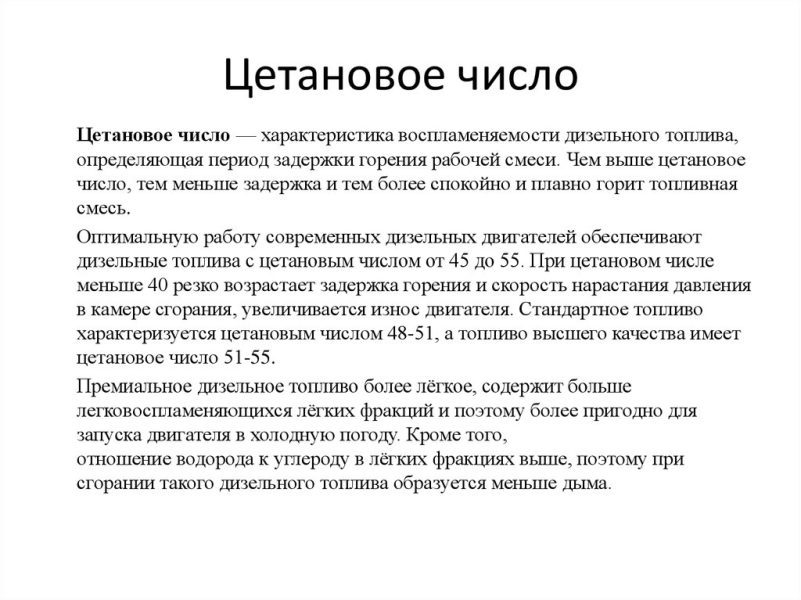
What is the cetane number of diesel fuel?
The cetane number, as an important parameter in the properties of diesel fuel, indicates its quality in terms of the characteristics of the diesel fuel, which is critical for a diesel engine. In other words, the cetane number corresponds to the ignition delay time of the diesel fuel after injection into the cylinder.
As with the octane number, the cetane number suggests that the higher the number, the better the engine will perform. The fact is that even in this case, everything depends on the design of the engine, and often a high cetane number is a marketing ploy, and not a real improvement in engine performance.
The main requirement for fuel in the case of a diesel engine is its good ignition after injection into the cylinder. However, for the correct operation of the diesel engine, the so-called ignition delay. Ignition delay is the time that elapses between the injection of fuel into the combustion chamber and the moment of ignition itself. This time is represented by the cetane number. Suitability acc. the duration of the ignition delay is determined by the design of the engine (combustion chamber) and the injection equipment. An engine that burns fuel with the right cetane number starts well, has adequate power, quieter and smoother operation, lower consumption, and exhaust gases with a better emission composition. Too low cetane number of diesel fuel leads to too long ignition delay, and at the moment of ignition, the atomized fuel in the combustion chamber is already partially evaporated. This will cause the vaporized fuel (more fuel than needed) to immediately ignite, causing the pressure in the engine's combustion chamber to rise too quickly. This leads to too noisy engine operation, poor cleaning performance and reduced emissions. Conversely, too high a cetane number results in too short an ignition delay, which means that the fuel does not have time to atomize well and begins to burn very close to the nozzle. This leads to the fact that its holes are covered with soot. Insufficient atomization also means poor mixing with air, resulting in incomplete combustion and soot formation.
Most of the diesel fuel used in the world to drive internal combustion piston engines has a cetane number of about 51-55. Our and European standards require a cetane number of at least 51, premium diesel from some manufacturers reaches a cetane number in the range of 58 to 65 units. The appropriate cetane number is set by the diesel engine manufacturer and currently required values are between 50 and 60. In terms of emission reductions, these values should be gradually increased in the future, with power gains being a secondary priority.
The value of the cetane number is determined similarly to the octane number of gasoline, that is, the volume fraction of two substances. The first is cetane (n-hexadecane C16H34) - cetane number 100, characterizing a very short ignition delay, and the second - alpha-methylnaphthalene (C11H10) - cetane number 0, characterizing a very long ignition delay. By itself, clean diesel fuel does not contain too much cetane, it is used exclusively in comparative blends. The cetane number, like the octane number of gasoline, can be increased by adding special additives such as alkyl nitrate or di-tert-butyl peroxide. Also interesting is the relationship between octane and cetane numbers. The higher the cetane number of a given hydrocarbon fuel, the lower its octane number. Conversely, the lower the cetane number, the higher the octane number.
Questions and answers:
What is the octane rating of diesel fuel? Diesel fuel should have a cetane number of 45-55. In this case, the engine will perform optimally. With a cetane number below 40, combustion is abruptly delayed, and the motor wears out more.
What is the octane number of pure gasoline? Gasoline is obtained by distillation and selection of some fractions of oil at boiling point within 100-130 degrees. All these gasolines have a low octane number. The highest RON (65) is obtained for straight-run gasolines from oil from Azerbaijan, Sakhalin, Krasnodar Territory and Central Asia.
How to increase the octane number of the fuel? For this, paraffinic and aromatic hydrocarbons of a branched structure are added to gasoline. These substances are included in some additives.
Which hydrocarbon is the reference for determining the cetane number of diesel fuel? The individual hydrocarbons hexamethyldecane (cetane) and alpha-methylnaphthalene are used as standards. Their cetane numbers are 100 and 0, respectively.

